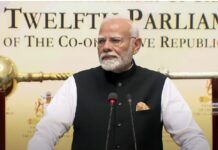Successful Press Meet Marks the Launch of Cyclothon and Walkathon Event in Observance of World No Tobacco Day
Resource Centre for Tobacco Control (RCTC), Department of Community Medicine & School of Public Health, Postgraduate Institute of Medical
Education and Research (PGIMER) Chandigarh, in collaboration with various other
organisations is commemorating World No Tobacco Day 2023 with the theme “We need
food, not tobacco”. Dr. Goel, Professor of School of Public Health and Program Director explained that this theme aims to shed light on the negative impact of tobacco on individual health, economic development, food production, and poverty, thereby encouraging
individuals, communities, governments, and organizations to advocate for healthier lifestyles, tobacco cessation, and policies that emphasize food security while combating tobacco use. Around 1 in 4 farmers growing tobacco are affected by green tobacco sickness with symptoms like nausea, vomiting, breathlessness, abdominal pain and many more. The
exposure to heavy chemicals and nicotine due to tobacco farming absorbs nicotine equivalent to 50 cigarettes per day, Dr Goel said. Dr. Goel emphasized the staggering statistics that approximately 700 deaths occur every minute in India due to tobacco use, and globally, tobacco consumption accounts for approximately 5,500 deaths per minute, said Dr Goel. PGIMER along with various organisations like Indian Medical Association, Indian Red Cross-Punjab, Indian Dental Association, Punjab University, SIPHER and other clinical departments of PGIMER are jointly organising Cyclothon and Walkathon event from PGIMER to Sukhna lake in commemoration of World No Tobacco Day on 28th May which shall be flagged off by Prof. R K Ratho, Sub-Dean Research, PGIMER, Director, Dr. Ashish Gulia, Director, Homi Bhabha Cancer Hospital & Research Centre, New Chandigarh,
Mohali, and Sangrur, Dr Adarshpal Kaur, Director, Department of Health and Family
Welfare Punjab, and Dr Suman Singh, Director Health Services cum MD NHM Chandigarh.
The event will be Chaired by Hon. Health Secretary, Chandigarh Administration, Mr Yash Pal Garg (IAS) at Sukhna lake along with Guest of Honours President IMA Chd Dr Gurvinder Singh and Sh Shivdular Singh Ex IAS Secy Pb Red Cross. The event shall be attended by almost 500 participants.
A press meet was organised in this regard at PGIMER Chandigarh where Dr. Goel clarified that hookah smoking is not safer than cigarette smoking and that the smoke from hookah contains numerous toxic chemicals. Regarding electronic cigarettes, it was highlighted that
they are not harmless water vapor but contain nicotine and have been linked to respiratory and cardiovascular problems. As for beedi smoking, it was clarified that beedis are not less harmful than regular cigarettes and carry similar health risks. The press conference also touched upon the common laws in India against tobacco, including the Cigarettes and Other
Tobacco Products (Prohibition of Advertisement and Regulation of Trade and Commerce,
Production, Supply, and Distribution) Act, 2003 (COTPA). Media representatives were
informed about the actions a common man or non-smoker can take when encountering someone smoking or selling tobacco to minors, such as requesting individuals to refrain from smoking in public places and reporting instances of tobacco sales to minors to the designated
authorities.
Furthermore, Dr. Goel shared valuable insights on the role of RCTC in combating tobacco use. RCTC serves as a reliable single point resource platform, providing information and educational materials to raise awareness about the detrimental effects of tobacco. They collaborate with various stakeholders, including government bodies, healthcare professionals, educators, and community organizations, to disseminate accurate information and promote tobacco control strategies and interventions.
The media also inquired about techniques for quitting tobacco and available cessation
options. Dr. Goel emphasized the importance of identifying a quitting companion, choosing a specific date to quit, recognizing triggers, engaging in physical activity or hobbies, and seeking support from tobacco cessation centers, such as the one.
















